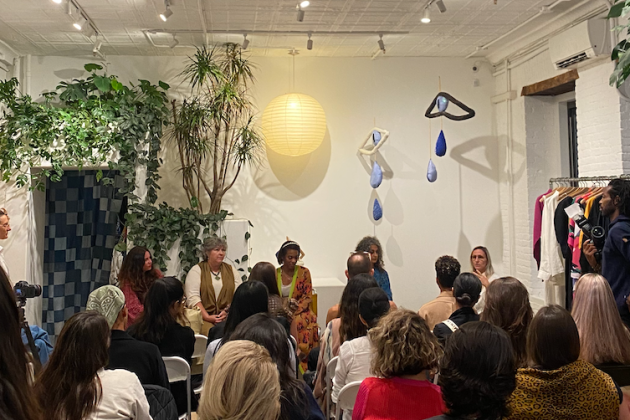Mara Hoffman Gathers Fiber Enthusiasts at First In-store Industry Talk

Mara Hoffman convened fashion’s fiber and climate enthusiasts for a lighthearted yet fired-up conversation in her Lafayette Street store.
It was the first time the contemporary designer hosted an industry conversation in her incense-scented and plant-filled retail storefront, which opened last year, as previous gatherings took on a more intimate feel for artist fireside chats. The certified-Climate Neutral brand has been a dedicated and vocal advocate in the sustainability community since several years ago when Hoffman decided to pivot her company’s mission.
More from WWD
Dana Davis, vice president of sustainability at Mara Hoffman moderated the session billed as a “Climate Beneficial” panel which included Chantelle Davis, a new designer and founder of label Boe Davis; Liz Alessi, a Coach brand and sustainability consultant; Stacie Chavez, president of Imperial Yarn, and Laura Sansone, creator of New York Textile Lab.
For many of the panelists, the chat was a chance to reflect on their careers and sustainability strides. “For the first time in my entire fashion career, I can say I feel good about my job,” said Alessi, describing how easy it is to float sustainability ideas — including the use of materials such as algae leather — straight to the top now that she’s somewhat of an outside sustainability consultant and not in the sourcing department at Coach anymore. In her case, she’s speaking directly to Coach creative director Stuart Vevers. (Though, the algae material isn’t announced in any Coach bags yet, it’s a look at things to come especially as Vevers takes circularity more central to the American brand.)
Though Coach isn’t perfect, the Tapestry-owned brand has committed to source 90 percent of its leather from gold- and silver-rated leather tanneries by 2025 as well as pursue regenerative leather.
Chantelle Davis, who founded the label Boe Davis, is also fueled by a similar fiber motivation. “I wanted to stop being so disinterested in clothes,” she said. “The polyester blended in every single thing was never really to our benefit.” She’s committed to natural fibers and domestic manufacturing.
During the discussion, New York Textile Lab’s founder Laura Sansone was intent on communicating the importance of bioregional ecosystems, or the fibershed systems happening in a 300-mile radius, that present unique growing limitations and capacities.
To her, fibers present a “growth logic” that lets new ideas percolate and creates value in the end product for the end user. But consumers need to know the special story behind it all. An example? “Tick leather,” as she noted, sounds questionable but is really the result of minor imperfections in hides (or farm life) affected by ticks. “Doesn’t that make it nuanced and special? Doesn’t that connect it to the land?” probed Sansone.
But being special comes at a price shock, for now, until the system gets behind such new projects as “C4,” a cotton sourcing initiative from Reformation, Fibershed and more, which Stacie Chavez, president of Imperial Yarn and partner to Fibershed made mention to as she talked about the reasons why Climate Beneficial products pay more in the livelihood of the industry.
For over five years, Climate Beneficial Wool has been verified in the U.S. by Fibershed and sourced from land stewards who are enhancing carbon drawdown through agricultural practices that regenerate soil health. Mara Hoffman, for one, uses the wool for her knitwear.
“Are we more expensive? We are, but we pay our ranchers more,” said Chavez. “Our ranchers earn a bonus for maintaining those carbon farm plants. We’re doing good work. The biggest compliment I’ve ever gotten is [when] one of my ranchers called me and said, ‘You know, wool is on our financial statement now. It’s making an impact. We actually made money on our wool this year.'”
